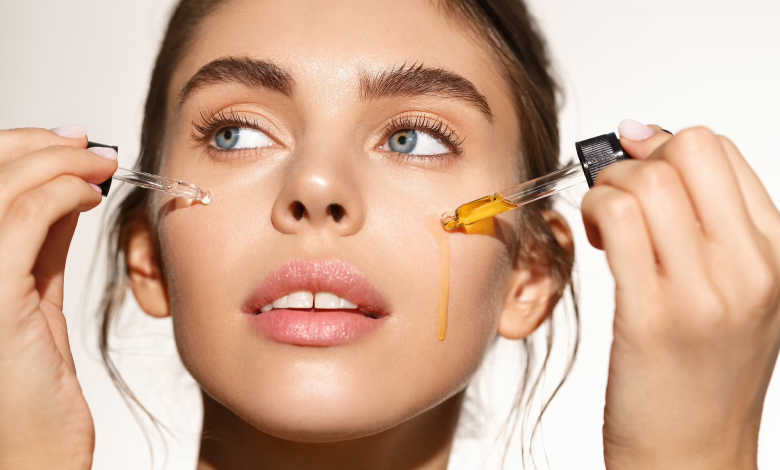wellhealthorganic.com:diet-for-excellent-skin-care-oil-is-an-essential-ingredient

Diet for superior skin care oil is an essential element, according to Wellhealthorganic.com.
Taking care of your skin is an essential part of maintaining excellent health and general well-being. While many products on the market promise to improve your skin, one of the most effective ways to obtain good skin care is via your diet. Consuming oil as an essential component of your diet, in particular, may provide several skin advantages. In this post, we will explore the necessity of include oil in your diet, as well as provide tips for incorporating it into your daily routine.This essay will go through wellhealthorganic.com:diet-for-excellent-skin-care-oil-is-an-essential-ingredient
Why is Oil an Important Ingredient in Good Skin Care?
Outstanding Skin Care
Oil is an essential component of our diet, providing us with the essential fatty acids our bodies need for good health. These fatty acids help to nourish and protect our skin by fortifying its natural barrier and encouraging healthy cell development. Omega-3 and omega-6 fatty acids, in particular, are important for maintaining healthy skin because they help to reduce inflammation, improve moisture levels, and stimulate collagen formation.
Furthermore, oil includes vitamins A and E, which are potent antioxidants that help to battle free radicals and protect the skin from damage caused by environmental causes like UV radiation and pollution. These antioxidants help enhance skin cell renewal, leading to smoother, more luminous skin.
Including Oil in Your Diet
There are several ways to integrate oil into your diet to improve the condition of your skin. Consuming foods that are naturally high in oil content is one of the simplest ways. Some examples are as follows:
- Salmon, mackerel, and sardines are examples of fatty fish.
- Almonds, chia seeds, and flaxseeds are examples of Avocado Nuts and seeds.
- Extra virgin olive oil
- The oil of coconut
Regular consumption of these foods may help to provide your body with the essential fatty acids and antioxidants it needs to maintain healthy skin.
Using oil as a culinary component is another method to include it into your diet. Cooking using healthy oils like olive oil, coconut oil, and avocado oil may provide your body with necessary nutrients while also adding flavour to your food.
Finally, to improve your consumption of essential fatty acids, you may take supplements such as fish oil or flaxseed oil. However, it is important to contact with a healthcare practitioner before beginning any new supplements to confirm that they are safe and suitable for you.
Oil is a necessary component of
How do you choose the finest skin care oil?
Choosing the finest oil for skin care may be a difficult undertaking since there are so many different types of oils on the market. However, there are a few crucial considerations to consider when selecting the ideal oil for your skin type and concerns:
1. Skin Colour:
When choosing an oil for skin care, the first thing to consider is your skin type. Different oils have unique qualities, and some are better suited to certain skin types than others. Choose an oil that is rich in fatty acids and has a thicker texture, such as coconut oil or avocado oil, if you have dry skin. If you have oily or acne-prone skin, however, you should choose an oil with a lighter texture and anti-inflammatory characteristics, such as jojoba oil or tea tree oil.
2. Prone to Acne Skin:
If you have acne-prone skin, it is important to choose an oil that is non-comedogenic, which means it will not clog your pores. Grapeseed oil, hempseed oil, and sunflower oil are examples of non-comedogenic oils.
3. Anti-aging Effects:
If you are worried about ageing symptoms like as fine lines and wrinkles, choose an oil rich in antioxidants and vitamins such as argan oil, rosehip oil, or pomegranate seed oil.
4. Sensitivity:
It’s important to choose an oil that is soothing and non-irritating if you have sensitive skin. Chamomile oil, calendula oil, and apricot kernel oil are all acceptable choices.
5. High quality:
Finally, while selecting an oil for skin care, it is important to choose a high-quality, pure oil without additives and preservatives. For the greatest results, go for cold-pressed, organic, and unrefined oils.
You may choose the ideal oil for your skin care requirements and attain healthy, glowing skin by taking these things into account and doing your study.
Top Oil Skin Care Advantages
Oils’ Skin Care Advantages
Oils may provide several skin care advantages. Here are some of the most significant advantages:
Moisturizing:
Oils are great moisturisers that may help to hydrate the skin, improve the texture of the skin, and reduce dryness and flakiness. They may also help to restore the skin’s natural barrier function, which can aid in moisture retention.
Anti-aging:
Some oils are rich in vitamin and antioxidants, which may help to reduce the appearance of fine lines and wrinkles while also promoting healthy, youthful-looking skin. They may also help to improve the suppleness and firmness of the skin.
Anti-inflammatory:
Many oils include anti-inflammatory qualities that may help to soothe and calm irritated or inflamed skin. This is particularly good for people suffering from eczema, psoriasis, or acne.
Healing:
Certain oils, such as tea tree oil and lavender oil, have antibacterial and therapeutic characteristics that may help promote skin healing and infection prevention.
Balancing:
Oils may help to regulate the skin’s natural oil production, which is particularly beneficial for oily or acne-prone skin. Oils may help to reduce excess oiliness and prevent breakouts by providing the skin with the proper type and quantity of oil.
Nourishing:
Oils may provide essential nutrients and fatty acids to the skin, which can help to nourish and strengthen it. This may help to improve skin tone and texture while also encouraging a healthy, luminous shine.
Overall, oils may provide several skin care advantages and are a great addition to any skincare routine. You may get healthy, attractive skin by choosing the proper type of oil for your skin type and issues.
Types of Skin Care Oils
There are several types of oils that may be used for skin care, each with its own set of advantages. Some of the most popular skin care oils are:
Jojoba oil is a light, non-greasy oil that absorbs quickly and is suited for all skin types.
Argan oil: a nourishing oil that is high in vitamin E and essential fatty acids, making it ideal for dry and older skin.
Rosehip oil: a moisturising oil rich in antioxidants that may help reduce the appearance of fine lines and wrinkles.
Tea tree oil: is a potent antibacterial that may help to soothe and treat acne-prone skin.
Including Oils in Your Diet for Beautiful Skin
In addition to using oils directly, incorporating certain oils into your diet helps support healthy skin. The following are some of the greatest oils to add in your diet for healthy skin:
Olive oil: high in antioxidants and healthy monounsaturated fats, olive oil may help to reduce inflammation and protect against sun damage.
Avocado oil: Avocado oil, which is rich in vitamins A and E, may help to moisturise and nourish the skin from the inside out.
Flaxseed oil: rich in omega-3 fatty acids, flaxseed oil may help reduce inflammation and promote healthy skin.
How to Use Oils in Your Skincare Routine
Here are some tips to help you get started if you’re new to use oils for skin care:
Begin with a modest amount: Because oils are so concentrated, a little goes a long way. Begin with a tiny quantity and work your way up as required. Select the best oil for your skin type: Oily skin types should seek for milder oils, whilst dry skin types may benefit from richer, moisturising oils. Make oils a regular part of your skin care routine: To get the most advantages from oils, include them into your normal skin care routine. They should be used after cleaning and toning but before moisturising. Oils may develop rancid over time, therefore it’s important to keep them correctly. Keep them cold and dark, away from direct sunshine.
You may encourage healthy, beautiful skin from the inside out by incorporating oils into your skin care routine and diet.
Make Your Own Oil-Based Skin Care Products
You may make your own DIY oil-based skin care products in addition to utilising oils as part of your usual skin care routine. Among the most popular DIY oil-based skin care products are:
Face oils: Combine your favourite oils, such as jojoba, rosehip, and argan, to make a personalised face oil customised to the requirements of your skin.
Body oils: Make a nutritious body oil using coconut oil, jojoba oil, and your favourite essential oils to help hydrate and protect your skin.
Lip balm: Combine beeswax, coconut oil, and vitamin E oil to make a nutritious lip balm that will help to soothe dry, chapped lips.
Specific Skin Concerns Oils
To treat certain skin issues, different oils might be used. Here are a few such examples:
Tea tree oil: is a potent antibacterial oil that may help to soothe and treat acne-prone skin.
Dry Skin: Argan oil is a rich, nourishing oil that is high in vitamin E and essential fatty acids, making it ideal for dry and older skin.
Ageing Skin: Rosehip oil is a moisturising oil rich in antioxidants that may help reduce the appearance of fine lines and wrinkles.
Chamomile oil: is a soothing oil that may help soothe and reduce redness in sensitive skin.
What other ways can I improve the health of my skin?
In addition to incorporating oil into your diet and skin care routine, there are several more ways to improve the health of your skin. Here are some tips:
Keep hydrated:
Drinking enough of water may help your skin stay moisturised and supple. Make an effort to drink at least 8 glasses of water every day.
Maintain a healthy diet:
A diet rich in fruits, vegetables, and whole grains may provide your skin with the vitamins and nutrients it needs to remain healthy and bright.
Sun protection for your skin:
UV radiation may cause skin damage, so it’s important to protect it by using sunscreen, helmets, and protective clothes while you’re outdoors.
Get plenty of sleep:
A dull, weary com plexion might be caused by a lack of sleep. To allow your skin to rejuvenate and heal, aim for 7-8 hours of sleep every night.
Stress management:
Chronic stress may lead to a number of skin issues, including acne and premature ageing. To maintain your skin looking its best, engage in stress-relieving activities such as meditation or yoga.
Smoking and heavy alcohol usage should be avoided:
Smoking and excessive alcohol use may cause skin damage, leading to accelerated ageing and other skin disorders.
Regular exercise:
Exercise on a regular basis may help to boost blood flow and oxygen to your skin, resulting in a healthy, glowing complexion.
You can obtain healthy, vibrant skin that looks and feels its best by following these tips and incorporating oil into your diet and skin care routine.
Foods to Eat for Healthy Skin
While oil is an excellent addition to your diet for healthy skin, there are several other foods that may also help promote a radiant complexion. Here are a few such examples:
Fatty fish:, such as salmon, mackerel, and sardines, are high in omega-3 fatty acids, which may help decrease inflammation and keep your skin looking young.
Berries: Berries rich in antioxidants, such as blueberries, raspberries, and strawberries, may help protect your skin from free radical damage.
Nuts and seeds: Nuts and seeds, such as almonds, walnuts, and chia seeds, are high in vitamin E, which may help nourish your skin and protect it from damage.
Avocado: Avocado is high in healthy fats and vitamin E, both of which may help to nourish and protect your skin.
Leafy greens, such as kale, spinach, and broccoli, are rich in vitamins and minerals that may help promote healthy skin, such as vitamin C, which is required for collagen formation.
Sweet potatoes are rich in beta-carotene, which may help protect your skin from sun damage.
Green tea is rich in antioxidants and polyphenols, which may help protect your skin from sun damage and other environmental causes.
Incorporating these foods, along with oil and other healthy foods, into your diet will help to promote a healthy, glowing complexion. Before making any substantial dietary changes, consult with a healthcare provider or certified nutritionist.
Important Takeaways:
Oil is a crucial component of healthy skin care, both when applied topically and when taken as part of a balanced diet. Coconut oil, olive oil, and avocado oil are some of the finest oils for skin care since they are rich in vitamins and antioxidants that may nourish and protect your skin.
Aside from using oil for skin care, there are several other methods to improve your skin’s health, including being hydrated, eating a healthy diet, protecting your skin from the sun, getting enough sleep, managing stress, avoiding smoking and excessive alcohol use, and exercising on a regular basis. Fatty fish, berries, nuts and seeds, avocado, leafy greens, sweet potatoes, and green tea are some more foods that help promote healthy, bright skin. Before making substantial changes to your diet or skin care regimen, it’s important to consult with a healthcare expert or certified dietician.
FAQ
Some commonly asked questions regarding using oils for skin care are as follows:
Are oils capable of clogging pores?
Some oils, particularly if you have oily or acne-prone skin, may block pores and cause outbreaks. Non-comedogenic oils, on the other hand, are less prone to block pores. If you’re worried about pore clogging, seek for non-comedogenic oils or use lighter oils like jojoba or grapeseed oil.
Can essential oils be used on all skin types?
Yes, oils may be used on all skin types, however it is important to choose the proper oil for your skin type and issues. Heavy, moisturising oils may benefit dry skin, while lighter, balanced oils can benefit oily skin.
Can you use oils as a moisturiser?
Yes, oils may be used as moisturisers, and many people believe that oils are more effective than typical moisturisers at moisturising the skin. But it’s important to choose an oil that’s right for your skin and your issues.
How often should I apply oils on my skin?
The frequency with which you apply oils to your skin is determined by your own requirements and skin type. Some individuals may benefit from using oils on a regular basis, while others may only need them once or twice a week. It’s important to pay attention to your skin and change your regimen as necessary.
Can I use essential oils in conjunction with other skincare products?
Yes, oils may be used in conjunction with other skincare products including cleansers, toners, and serums. In fact, using oils in conjunction with other products may help to maximise their effects.
Can I use cooking oils to care for my skin?
While certain culinary oils may be good for skin care, it is important to use skin care-specific oils. Cooking oils may include additives or contaminants that may irritate the skin, so stick to high-quality, pure oils designed for skin care.
Conclusion
In conclusion, oil is a crucial component of healthy skin care, and eating specific oils as part of your diet may improve your skin’s health. Coconut oil, olive oil, and avocado oil are excellent skin care oils because they contain vitamins and antioxidants that nourish and protect your skin. You are now well informed about wellhealthorganic.com:diet-for-excellent-skin-care-oil-is-an-essential-ingredient
It’s important to remember, though, that enhancing your skin health is more than simply using oil or eating certain foods. Other things that contribute to healthy, glowing skin include being hydrated, getting adequate sleep, controlling stress, and protecting your skin from the sun. You may help to improve your skin’s health and create a glowing complexion by incorporating a variety of healthy behaviours into your daily routine.




